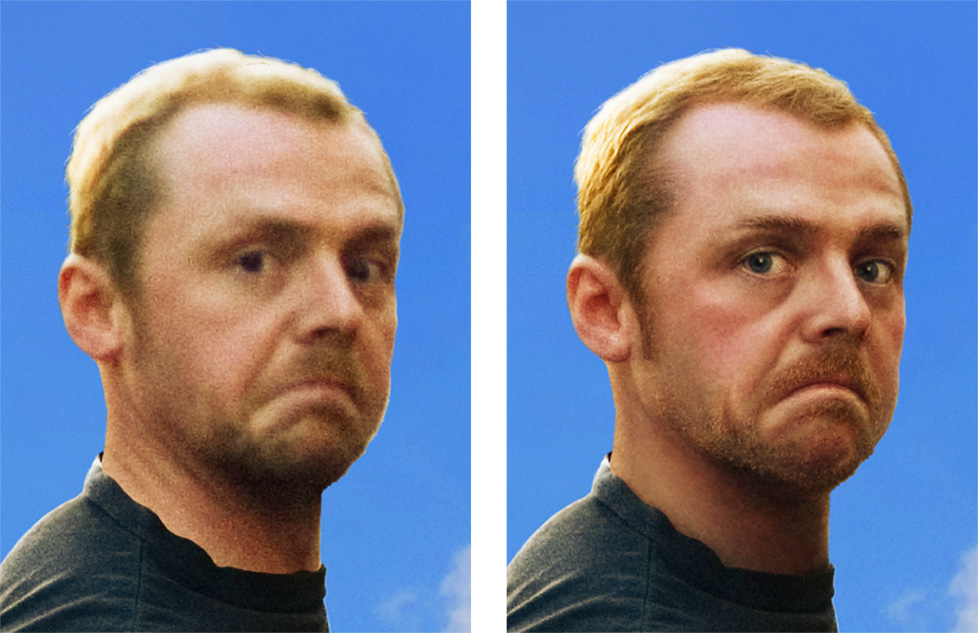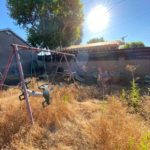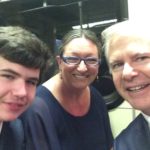Unsolicited advice on how to make it in the creative world, from someone who has been in the trenches for a while.
Many years ago I had a job as a delivery driver for a rental company. This was back when I was around 19 or 20. By then I had completed exactly one year of college before dropping out to play in a Christian rock band. The Christian part was new, but the musician part was not. (spoiler alert: I’d eventually fail at both).
Music was the first art form I’d tried that I could unselfconsciously immerse myself in. Oh, I’d been doodling since elementary school, but I could never draw uncritically. I was always finding fault with my work. It was never good enough. Besides, I never saw myself as an artist. My mom was an artist and taught art, so I had a pretty clear idea about that path, and I was sure it wasn’t for me (spoiler alert: I’ve been a professional artist for over 30 years now). The important part here being I could see myself as a rock musician. The music wasn’t that hard, and the rewards (money, fame, girls, and drugs) all were enticing. It was a future I could embrace. It was my shortcut to success and adulthood.
Besides, music was fun to play.
All I had to do was try hard, and eventually I would succeed. Someone would notice my drive, my earnestness, and pick me from the crowd. Then my life would be nothing but limousines and pretty girls, and no more cares about money.
And why not? This pattern had always worked for me before. I was quirky, which meant I had that perfect blend of creative and smart. Teachers for the most part liked me. I was exciting to have in a classroom. I was surprising (in a good way). I had potential. The way I figured, if I was always going to be somebody, I might as well be the somebody I wanted, and right then I wanted to be a rock star.
And I REALLY WANTED IT. I was an unknown kid from a shit little town, struggling (and failing) to remain middle class. I had all the desire you could want. I NEEDED it with a white hot WANT, and I wasn’t going to settle. I was going to have it all.
Somewhere along the way I also became a Christian, but this was not an impediment to my musical success. Quite the opposite. I’d been listening to Christian music, and realized there was a dearth of good rock songs about God. Most of it was pretty tame in comparison to the secular rock I’d loved so much.
So I went for it.
It was somewhere during that time that I worked for this rental place. The job, as I told everyone in ear shot, was only a stepping stone. Success, real success (meaning rock star fame and fortune) was just around the corner. Sure it was the Christian version of rock star, so less drugs and more earnestness, but I was good at being earnest. So it was no surprise that on a slow day I pulled out my guitar to practice in the back.
The boss had recently hired a new guy named Steve. (I’m sad to say I forget his name, so I’ll call him Steve) Steve was a little older, and probably a lot wiser, but we got along okay. He worked up front with the customers (something I didn’t do well), and I drove delivery. Still, we were close enough that when he heard me practicing, he came walking to the room, past all the half assembled lawn mowers and dirty dishes, wearing an expression in his face like he was close to tears. Then as he approached he got down on his knees in front of me, clasped his hand together as if in prayer, proceeded to blubber.
For those of you who grew up in the church, he was mimicking an altar call. For those who didn’t earn their merit badge in exuberant protestantism, he was faking the spiritual ecstasy of someone about to have a conversion experience. Mind you, I knew he was being funny, I even knew he was being funny at my expense, I just didn’t understand why. I laughed, because it was funny, but I didn’t get what he was doing. Why was he making fun of me in that way?
I know now it was because I was exuding desperation and earnestness like a bad cologne. Exuding it so hard it made everyone around me uncomfortable. I was practically screaming my want to the world.
And it wasn’t enough.
Many years later, I was living in another town (Los Angeles) and working in another industry (entertainment advertising). By then I was a professional, earning a professional wage. I even had my own office. I worked for a small division of a slightly larger company. I had also met Teri by then and was either engaged or about to be engaged. Basically I was in my mid 30s, and settling down. I was also having a kind of crisis.
See, at the time I was a finisher, which is the last person to touch a piece of art (like a movie poster) before it is printed. My job was to take designs that had been put together with more speed than skill, and make them into a cohesive piece of art. Finishing is a job that is more technical than creative. The big design ideas have already been worked out. Your job is to make sure all the fiddly bits, all the small details, work together.
My problem was, I didn’t find the work creative enough.
Most of the people I worked with were finishers like me. We’d come into the business from the technical side. None of us had gone to art school. None of us were deeply creative (or creative as I saw it then). So when we got a new boss for our division, one who was both an outstanding Illustrator and a photographer, I took him aside one day and asked him how one got to be a designer.
His name was Michael Elins, and while his advice was a little mixed (he’s a much better visual artist than a writer), and full of exacerbation with me, (he must have thought my question was like asking a fish why they liked water) still, his words have stuck with me to this day. What he told me was that a designer didn’t just do designs. They got design magazines, they went to art shows, they made friends with other designers, they worked at design agencies. It wasn’t just a job, it was a whole experience.
The feeling I got from him was design was a kind of lifestyle. As if design was something one did, like being gay, or being a banker. It was a whole package.
This was a lot closer to the truth than Steve’s display at the rental place. But it took me a few more years to have both of them make sense.
Basically, what I think Michael was hinting at was that an artist first and foremost does art. That is, they do the work of being an artist. This is not unlike something that authors often say: A writer writes, or a painter paints. The main point being, it is not enough to want to be something like a designer or a rock star. You have to do the work.
The key is not desire. You can have all the desire in the world and still not succeed. The key is in the work. It’s not enough to grow out your hair, or pierce your ear, or say all the right words.
The thing is, much of the world doesn’t work this way. To be a Christian all you have to do is say you are. The same is true for most jobs that are considered unskilled. No one is going to check to see if you are really a dishwasher or a waiter. Sure there are limits to what you can say about yourself, but for much of the world, especially much of the middle class world, “fake it til you make it” is a tried and true recipe for success.
It just doesn’t work in the creative world.
About a month ago, a very successful author posted something on FaceBook about “being” an author. They were giving the tried and true advice I included above: A writer writes. Many of the replies showed that the other fans of this author were not “getting it”. They were under the impression that if you had a good enough idea, or sufficient raw talent, then that was enough.
I don’t blame them, it took me decades to work this out, mostly by failing, over and over. So allow me to save you that failure if I may.
The reality is this: If you want to make a living in a creative field you’re going to be facing a long uphill battle. I promise you, it will be a slog. There are three major reasons for this.
The first is about the numbers.
The truth is there’s a lot more people who want to do the work than there is money, and there’s not a lot of money. Sure there are success stories, but these people are vanishingly rare. For every Stephen King or Elton John there are tens of thousands of people who you will never know doing the exact same work for next to nothing.
Because of this, to succeed, even at a modest level, means you have to find a way to separate yourself from the pack. It very much is a competition. To be better you need to do more than just want to be successful. After all, everyone else also wants to be successful, and some of them surely want it more than you. Really wanting something is just the floor, not the ceiling. It’s the minimum standard.
Sure, there is a component of luck to this as well, but luck will only take you so far.
The second is about the process.
You don’t get good at any craft (be it writing, or painting, designing, or playing an instrument) by doing it once a week or once a month. You have to do it over and over, hour after hour, year after year. You have to practice it until your fingers bleed and your hopes turn sour. You have to practice until you reach the point that you are sure no one else in the world is going to care, and then you have to practice some more.
The value of art is in the doing, not the thinking. You can have a million dollar idea for a movie or a novel, but until you do the work of making that idea a reality – something you can hold in your hands or show to others – it’s not worth two cents. Art without action is nothing. Ideas, like desire, are just the floor, not the ceiling. You need something else.
The third is about standards.
It’s not enough to do the work, you have to do it well. You have to be demanding of your creative output. You have to hold it to the white hot fire of criticism, and burn off all the bad parts. You have to develop a critical eye. You have to be willing to be discontent. You have to suck, over and over until your work starts to suck less; until you reach the point where you stop making the obvious mistakes and start making the subtle yet challenging real mistakes, and then start all over again.
This is the point Michael Elins was trying to convey to me all those years ago. Good designers are always comparing their work to other designers, usually the very best, and then working hard to perform at that level. They talk to other professionals in their field, they notice all the work that is being done, and they are fucking critical about it. Most importantly, they are critical of their own work.
The thing is, this part is hard, perhaps the hardest. Just having the ego to think that you can create, that your ideas are important, that something living only in your head needs to be in the outside world, is super difficult. Especially, if no one else in the world gives a damn. Sure, you can surround yourself with others who care. I was in several bands when I was a musician, but even that wasn’t enough. The enemy is always the person you face in the mirror. If you shit too much on your own work, if you are too critical, you can shoot yourself down and keep yourself from creating. If you are not critical enough then you can go on for years being mediocre and never understanding why you’re not finding success. It’s a very fine balance, and it is always changing.
And even then, even if you do all three of the things I mentioned above, your success is not guaranteed. You can go your whole life and only those close to you will see your efforts. Look up Larry Todd, of Aline Kominsky-Crumb. There are famous painters like Van Gogh, Cézanne, Monet, and Gauguin, who died before they became popular. Even authors like Sylvia Plath, Henry David Thoreau, Emily Dickinson, John Keats, Edgar Allen Poe, even fucking Herman Melville, all gained notoriety after they passed this earthly veil.
You can have all the desire in the world, you can do the work, and you can do the work at a very high level, and still not find success. That is the size of the mountain you are facing. All of us creative types face this, and yes it is fucking daunting.
But also, who cares? So what if it is hard? Everything is hard, everything is difficult. Just getting out of bed some days is too much. Don’t let the size of the thing fool you. It’s mostly in your head anyway.
Knowing all that, if you still want to be an artist here’s my advice:
First of all, if you want to be something, then be it. Don’t wait for someone else to give you permission. If you want to be a novelist, then write a novel. If you want to be a musician, then play your heart out. If you want to be the best chef in all of America, then start cooking up your own recipes.
Don’t wait on desire, do the work.
If you want to make money at your passion, if you want your passion to be more than just a side hustle, then you need to not only do the work but mix it up with the big boys. That means you need to be critical of your art, you need to refine it, edit it, make it better. You need to make it the best you can, and then you need to find a way to make it better. This is a journey, and it is NOT going to happen overnight. Developing a critical eye for your shit takes time. This is why there is no such thing as an overnight success, because becoming a professional takes hundreds or even thousands of hours of patience and dedication. They don’t pass that out at the corner. If they did then everyone you know would be a success.
Perhaps most important, if you tried to do something creative but didn’t have the wherewithal to take it to the top, DO NOT LOWER YOUR HEAD. Keep your chin up. You braved more than most. Failure is not a failure unless you decide not to learn from it, so learn. Maybe you’ll learn (like I did with music) that it’s just not an art for you. Maybe you’ll learn you just needed a break to let things settle down, before you start again. Maybe you’ll learn that it sucks and the big boys cheat (they do), and the work is totally unfuckingfun (it is).
Being a creative means taking it on the chin. Always. There is no path forward that doesn’t come with pain. Easy street is for suckers, not for us. Sometimes the only way to tell that you’re on the right path is when the blows come hard and fast and you keep going anyway.
But also, there is no shame in bowing out either. This is your life, you get to create it anyway you like. In fact, your life is your best creation. If you step down a path that gets too weird or too dark, it’s totally okay to walk away. Only you can set your standards, and only you are responsible to them. No one else should have that power over your passion, so don’t give it to them.
Bottom Line:
If you want to live, (not succeed, but live);
if you want to be happy (not content, but happy);
then you have to find joy in the work.
Find joy in what you do. Find joy in what you create. Find joy in the creative process. It could very well be the only happiness you will get from your passion, so celebrate it. Make the most of it. In the end, this is the only thing you are guaranteed.









